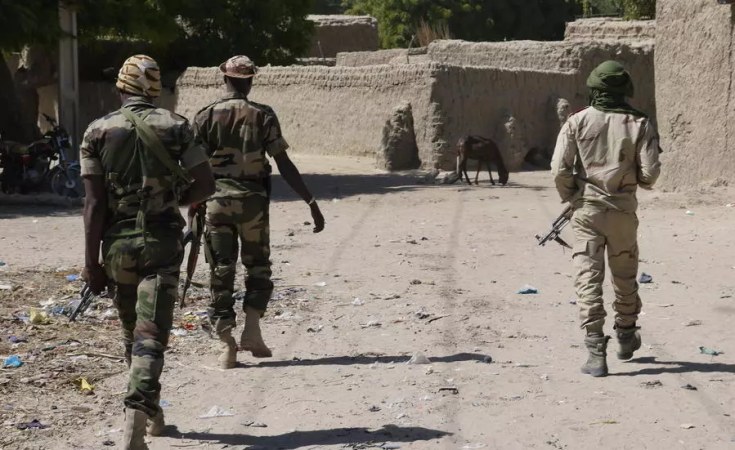The German and US defense ministers have said they see no immediate need to leave Niger, following France's decision to withdraw troops. Niamey's junta has been more focused on the former colonial power's presence.
US Defense Secretary Lloyd Austin and German Defense Minister Boris Pistorius both said on Monday that France's plan to withdraw its troops from Niger did not have immediate implications for other foreign forces in Niamey.
"We have an eye on the security situation, but there is no current need to take action," Germany's Pistorius said during a visit to Riga in Latvia. "It's not the time for overly hasty reactions," he said.
Pistorius had previously said that a withdrawal of French troops from Niger -- announced on Sunday by President Emmanuel Macron -- would pose a serious question as to whether Germany should follow.
Meanwhile, Lloyd Austin similarly said that the US would "evaluate" its future steps while continuing to pursue diplomacy with Niger's junta leaders.
"While we give diplomacy a chance, we will also continue to evaluate any future steps that would prioritize both our diplomatic and security goals," Austin, himself on a visit to Kenya in eastern Africa, told reporters on Monday.
French presence the apparent focus of junta's displeasure
Roughly 2,700 foreign troops are currently in Niamey -- around 1,500 of them French, around 1,100 of them American and another 100 from Germany's Bundeswehr. Until last month's coup, the country was considered one of the West's last reliable partners in the region, following a string of military takeovers in neighboring or nearby countries like Mali and Burkina Faso.
However, Niger's junta leaders have been far more vocal about the soldiers from former colonial power France in the country, repeatedly calling for them to leave -- along with France's ambassador.
On Sunday, having resisted this pressure for several weeks, Macron announced that France would be bringing its troops and Ambassador Sylvain Lette home in the near term. He said the precise details would be coordinated with authorities in Niamey and that he wanted the process to be peaceful.
Niger's junta rushed to describe the French decision as a "new step towards Niger's sovereignty," saying in a statement that "imperialist forces are no longer welcome on our national territory."
The junta has frequently sought to use anti-French sentiment to shore up support during the month since the presidential guard detained the man they were paid to protect and declared their own commanding officer, Adbourahmane Tchiani, as the new national leader.
Protests took place outside France's military base in the capital on Sunday.
The former head of France's military mission to the United Nations, Dominique Triand, told DW that France had been waiting to see for two months how the dust would settle in Niger, hinting at friction among various Nigerien military factions.
Triand said France now believed cooperation was "no longer possible," and that its troops could not continue trying to fight insurgents at Niger's request if no longer wanted. Asked about the danger of another country seeking influence, he said recent developments in Mali pointed in one direction.
"I don't see really a military involvement of China, but Russia certainly right now is already present in the Central African Republic, is present in Mali, probably will be present in Burkina Faso -- and we'll see in Niger," he said.
'We leaned on the French engagement there,' German lawmaker tells DW
Social Democrat member of the German Bundestag, Christioph Schmid, who is also on the parliamentary defense committee, told DW on Monday that the French withdrawal would have a serious impact for other foreign troops in Niger, given that France was the main contributor to the mission.
"Of course it has an impact on the European role in the region because France was always the biggest partner of the nations there," Schmid said. "And we leaned on the French engagement there."
He said it therefore would "of course have consequences for Germany," but also said he believed not necessarily in the short term.
Schmid welcomed the fact that Niger's junta, despite its complaints about imperialists and sovereignty, had not as yet demanded US troops leave the country in the same manner.
"I think it is important that we as the world have and have still a footprint in the Sahel region. And I think it's good that the United States still are there and we have to rethink the European role without the French role. And this is quite a task for us for the future. And this is what we have to do within the next couple of months," he said.
Schmid tried to tread a middle ground on the question of legitimacy, too. France had refused to negotiate with the military, at least publicly, saying it still recognized ousted Preisdent Mohamed Bazoum as the rightful leader.
The US, meanwhile, has shown a willingness to talk to the junta and has not described the military takeover as a coup -- perhaps partly because doing so could jeopardize its ability to keep troops there because of its own domestic rules.
"It's quite difficult to answer this question because, yes, we have a value-based foreign policy and yes, we do not accept military coups. But we have to accept the realities and we have to accept what is happening in Niger," Schmid told DW.
"And therefore, yes, both sides are right. Talking to the military leaders now in charge is probably the best thing to do in the way the United States do. But Emmanuel Macron is perfectly right when he says Bazoum is the legitimate leader of the country."
French troops were the only soldiers previously directly engaging alongside Nigerien troops against local militias and Islamists. The US and German troops are present in a support and training capacity only.
(AFP, dpa, Reuters)


